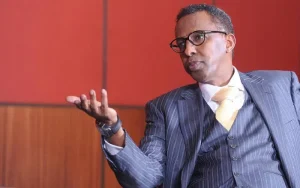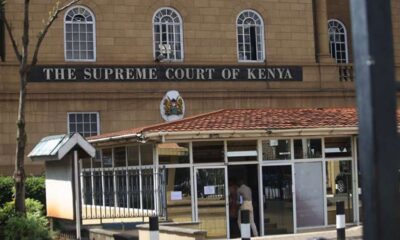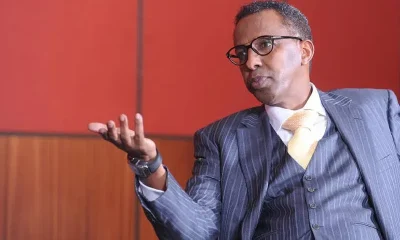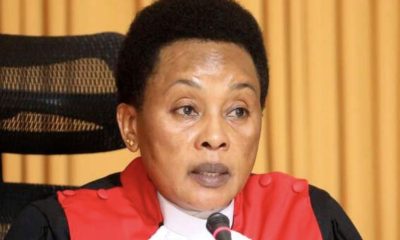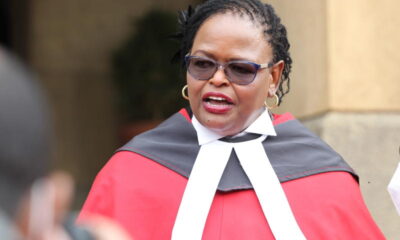Grapevine
Supreme Court Judge Accused in Ksh 6 Million Bribery Scandal
For this illicit service, the judge demanded Ksh 6 million, Ksh 4 million upfront as a deposit and Ksh 2 million upon delivery of the judgment.

Senior Counsel Ahmednasir Abdullahi alias Grand Mullah has dropped a bombshell claim by threatening to expose the details of what he claims is a brazen act of corruption involving a Supreme Court judge.
Taking on X, Abdullahi alleges that the judge solicited a Ksh 6 million bribe to sway a Court of Appeal case, only to fail to deliver the promised outcome and then refuse to refund Ksh 4 million already paid.
This explosive revelation has ignited fresh concerns about the integrity of Kenya’s apex court.
According to Abdullahi, the scandal unfolded about a month ago when a lawyer and their client met with the unnamed Supreme Court judge.
The trio discussed a pending case before a three-judge Court of Appeal bench, with judgment imminent.
The judge allegedly boasted of their influence, claiming that two of the three appellate judges were “his/her judges” and could be swayed to deliver a favorable ruling.
For this illicit service, the judge demanded Ksh 6 million, Ksh 4 million upfront as a deposit and Ksh 2 million upon delivery of the judgment.
The lawyer and client, persuaded by the judge’s assurances, paid the Ksh 4 million deposit.
However, the scheme unraveled when the Court of Appeal delivered its judgment days later, and the bribe-givers lost the case.
Abdullahi claims the Supreme Court judge failed to “speak to” the two appellate judges as promised.
Furious, they confronted the judge, demanding a refund of the Ksh 4 million. The judge allegedly refused to return the money.
What followed was a tense standoff.
Abdullahi says the lawyer and client, feeling defrauded, are now threatening to recover the funds “by force/physically.”
The situation, he warns, is “about to escalate.”
Abdullahi further claims he was approached to publicize the incident to pressure the judge into refunding the money.
“Please judge, kindly refund the Ksh 4 million for many people know about the incident,” he wrote, suggesting a broader circle of insiders aware of the scandal.
Abdullahi’s doesn’t stop at exposing the alleged corruption.
He challenges Chief Justice Martha Koome and the Judicial Service Commission (JSC), offering to share “the details” of the incident if they demonstrate genuine commitment to tackling judicial corruption. “I’m sure CJ Koome is aware of this,” he asserts, suggesting the allegations may already be an open secret within judicial circles.
This isn’t Abdullahi’s first clash with the Supreme Court.
In January 2024, the court banned him and his law firm from appearing before it, citing his relentless criticism of its judges.
Abdullahi, along with other prominent lawyers like Nelson Havi, has since led a vocal campaign against alleged corruption in the judiciary, accusing Koome and her colleagues of incompetence and misconduct.
The ban prompted petitions to oust all seven Supreme Court judges, fueling a bitter feud that now finds fresh ammunition in this bribery saga.
The allegations paint a troubling picture of a judiciary where justice is allegedly for sale, with judges wielding their influence improperly.
The claim that a Supreme Court judge could confidently promise to influence a Court of Appeal ruling only to keep the payment without delivering raises serious questions about the integrity of Kenya’s legal system.
If true, the incident suggests a potential network of complicity, with the judge’s reference to “my judges” hinting at deeper, systemic issues.
Legal circles are now abuzz with speculation about the judge’s identity and the case in question.
Kenya Insights allows guest blogging, if you want to be published on Kenya’s most authoritative and accurate blog, have an expose, news TIPS, story angles, human interest stories, drop us an email on [email protected] or via Telegram
-

 News2 weeks ago
News2 weeks agoTHE FIRM IN THE DOCK: How Kaplan and Stratton Became the Most Scrutinised Law Firm in Kenya
-

 Investigations2 weeks ago
Investigations2 weeks agoMulti-Million Dollar Fraud: Three Kenyans Face US Extradition in Massive Cybercrime Conspiracy
-

 Economy2 weeks ago
Economy2 weeks agoIran Demands Arrest, Prosecution Of Kenya’s Cup of Joe Director Director Over Sh2.6 Billion Tea Fraud
-

 Grapevine1 week ago
Grapevine1 week agoA UN Director Based in Nairobi Was Deep in an Intimate Friendship With Epstein — He Even Sent Her a Sex Toy
-

 Business2 weeks ago
Business2 weeks agoA Farm in Kenya’s Rift Valley Ignites a National Reckoning With Israeli Investment
-

 Arts & Culture2 weeks ago
Arts & Culture2 weeks agoWhen Lent and Ramadan Meet: Christians and Muslims Start Their Fasting Season Together
-

 Business2 weeks ago
Business2 weeks agoKPC IPO Set To Flop Ahead Of Deadline, Here’s The Experts’ Take
-

 Politics2 weeks ago
Politics2 weeks agoPresident Ruto and Uhuru Reportedly Gets In A Heated Argument In A Closed-Door Meeting With Ethiopian PM Abiy Ahmed

